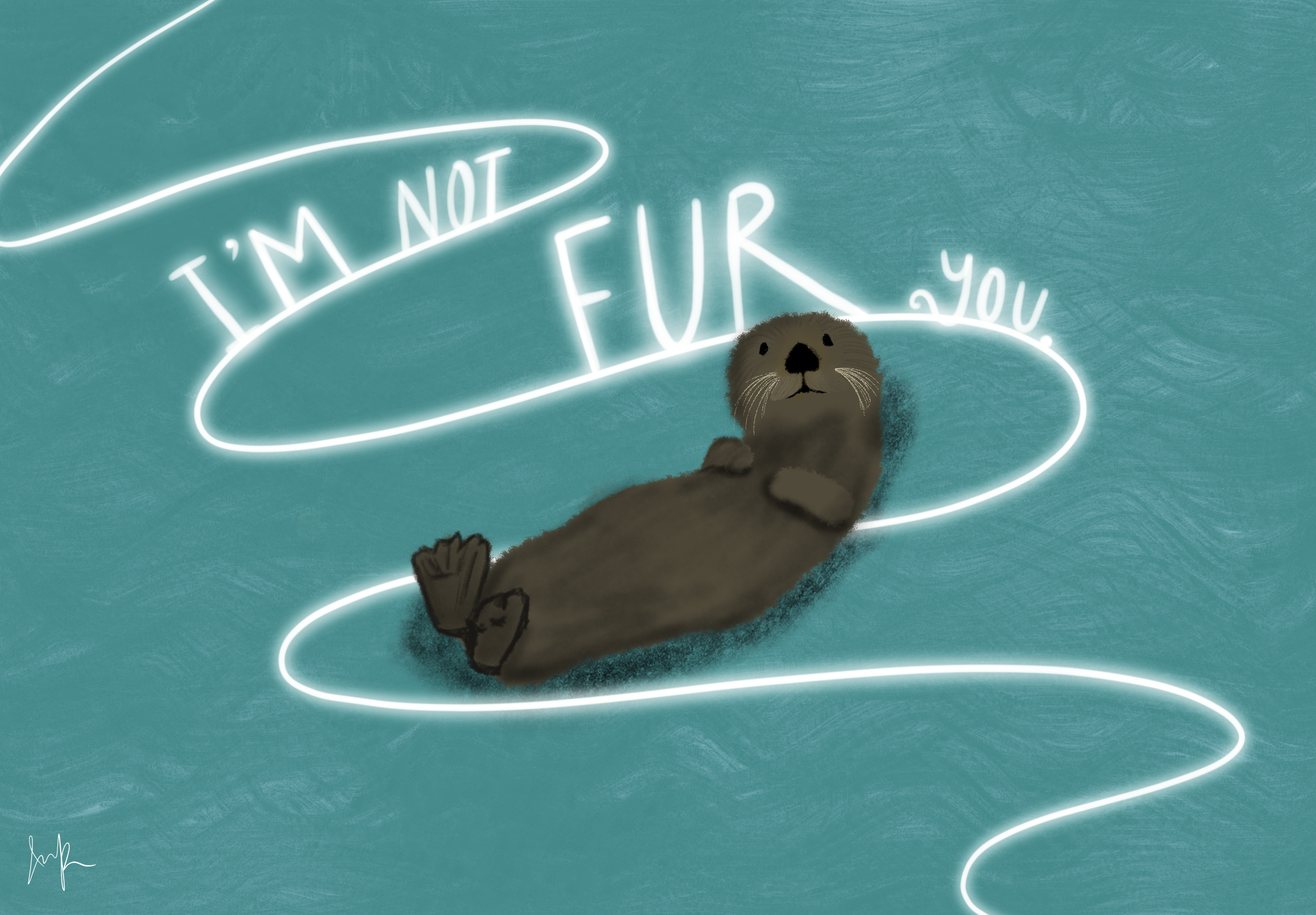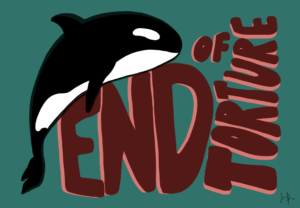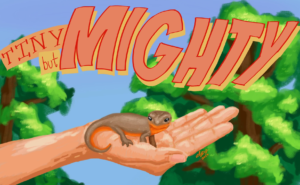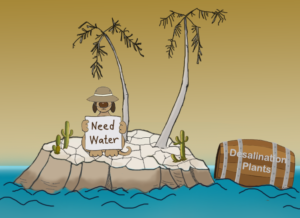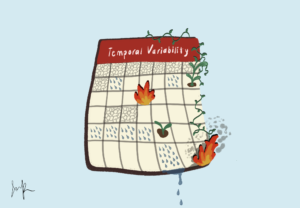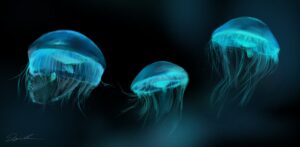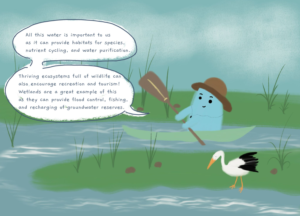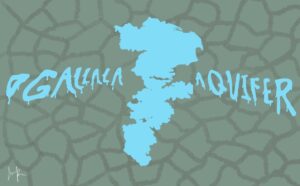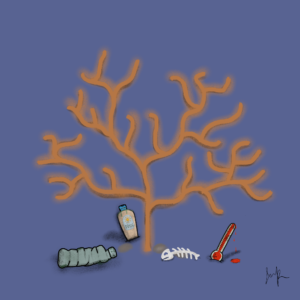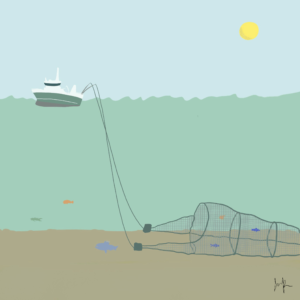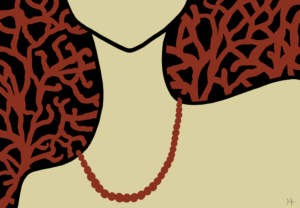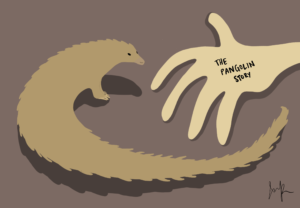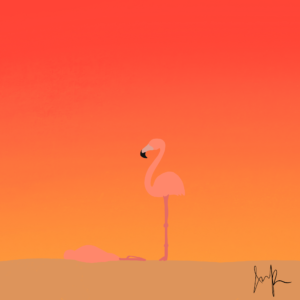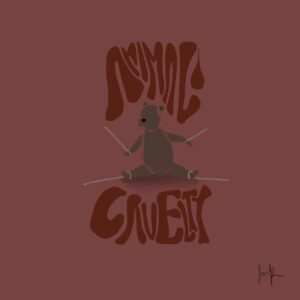Illustrated by Julianne Park. All rights reserved.
Sea otters are “keystone” species and as top predators, they maintain the balance in their ecosystems, such as kelp forests. Without sea otters, the sea urchins would undergo rapid population growth and eat all the kelp forests. The kelp forests provide protection and food sources for marine life in these ecosystems. Therefore, the sea otter’s population helps keep sea urchins in check and sustain the entire ecosystem.
In addition to their crucial niches, sea otters are incredible creatures. They are one of the only mammals that use tools. By smashing mussels on stones, they can crack the shells open. Otters also have very thick fur. According to Josh Cassidy, each fur is “around 1,000 times more dense than human hair” (Cassidy). They also lack the usual blubber marine mammals have. So, they depend on the insulation their fur provides them. When the hair gets dirty, it is more difficult to trap and absorb the air needed for heat.
Unfortunately, these extraordinary creatures are listed as Endangered on the IUCN red list with a constantly decreasing population.
Human activity threatens the populations of these furry creatures.
Fur trading became popular starting in the mid-1700s, especially for sea otters. Traders prized their pelts for their thickness and warmth. Consequently, they were nearly hunted to extinction; in the process, sea otter hunting led to the extinction of the sea cow. Read this article to find out more about the tragic story of the sea cow. In 1911, the International Fur Seal Treaty was signed to protect sea otters globally. Although it was a step further for conservation, they failed to protect many sea otter habitats, according to USGS. Although sea otters never recovered completely, with the help of regulations such as the Marine Mammal Protection Act and the Endangered Species Act, their numbers rose from dangerously low status.
Fishing also has a detrimental impact on sea otters. Otters are at risk of starvation when entangled in fishing gear. Boats could run over or hurt otters.
According to the Defenders of Wildlife in their article about sea otters, the significant threats are “oil spills, pollution, disease, and loss of kelp.”
As mentioned before, the fur of an otter is crucial to insulation and protection. During an oil spill, the oil coats the fur and prevents insulation, leading to consequences such as hypothermia and death.
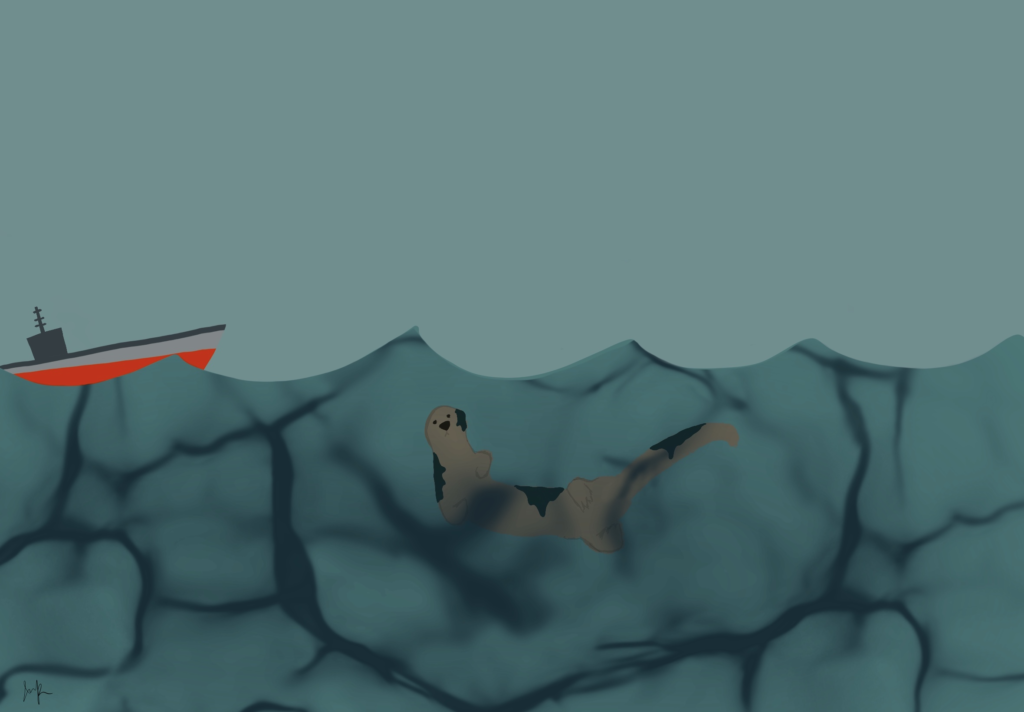
Illustrated by Julianne Park. All rights reserved.
Pollution is a global problem that does not discriminate against sea otters. Chemicals and pollutants washed into the sea can bioaccumulate through ocean food chains. For instance, shellfish and other sea otter prey can absorb these pollutants; consequently, the contamination intoxicates sea otters, leading to sickness or death. Researchers also discovered that Toxoplasma gondii, a parasite from cat feces, could harm sea otters after running off from wastewater treatment facilities.
Kelp provides several ecosystem services. For example, they absorb carbon and reduce atmospheric carbon dioxide levels. They also mitigate destructive and powerful waves. They also provide protection, food, and home to marine life and creatures like sea otters. However, they are currently experiencing a decline. According to NASA, climate change leading to warming waters or a “marine heatwave” hinders kelp growth. The extremity of recent climate change has exacerbated kelp decline and decimated forests. Imbalance in kelp ecosystems has also led to a decline in kelp forests, such as the loss of sea otters. Another example was when a wasting syndrome disease devastated the sunflower sea star populations. Sea stars were predators of purple sea urchins. With the decline of sea stars, these sea urchins devoured kelp to the seafloor, leaving nothing behind.
Protecting sea otters is simply an ethical matter: it is morally unjust for our irresponsible actions to kill any species to extinction.
Protecting sea otters is protecting kelp forests and other aquatic habitats. In short, everything is connected. The ocean, the land, the people, the animals, the plants. We are all connected. Our actions have an impact.
What can we do?
Stop Dangerous Fishing Practices
We must limit or eliminate dangerous fishing practices that endanger sea otters. For example, stop littering the oceans with fishing nets and gear.
Combat Climate Change
We need to reduce greenhouse gas emissions that are warming our atmosphere to prevent ocean temperatures from rising.
Stop Polluting
To prevent waste from running off or entering our oceans and waterways, we need to impose regulations on factories, agricultural and industrial facilities, etc.
Preventing Oil Spills
As important as it is to clean up oil spills, it is just as crucial to prevent them from happening in the first place. We need to learn from our past mistakes and incidents to prevent oil spills from constantly threatening wildlife.
Want to learn more?
https://www.iucnredlist.org/species/7750/164576728#conservation-actions
https://www.nrdc.org/onearth/spill-tracker
Works Cited
Combs, Sydney. “Sea Otters Use Tools, Too. Now Scientists Look at Their ‘Archeology’.”
Animals, National Geographic, 4 May 2021, https://www.nationalgeographic.com/animals/article/sea-otters-archaeology-tool-use-california.
Elissa Leibowitz Poma, WWF Travel Manager. “Ten Facts about Sea Otters.” WWF, World Wildlife Fund, 13 Sept. 2010, https://www.worldwildlife.org/blogs/good-nature-travel/posts/ten-facts-about-sea-otters.
“Monitoring the Collapse of Kelp Forests.” NASA, NASA, https://earthobservatory.nasa.gov/images/148391/monitoring-the-collapse-of-kelp-forests#:~:text=The%20loss%20of%20bull%20kelp,for%20lack%20of%20kelp%20sustenance.
“Sea Otter.” Defenders of Wildlife, https://defenders.org/wildlife/sea-otter.
VanBlaricom, Glenn R. “Synopsis of the History of Sea Otter Conservation in the United States.” USGS Publications Warehouse RSS, 1 Jan. 2015, https://pubs.er.usgs.gov/publication/70174141#:~:text=The%20Fur%20Seal%20Treaty%20of,all%20legal%20sea%20otter%20harvests.
The views and opinions expressed are those of the authors and do not necessarily reflect nor represent the Earth Chronicles and its editorial board.
